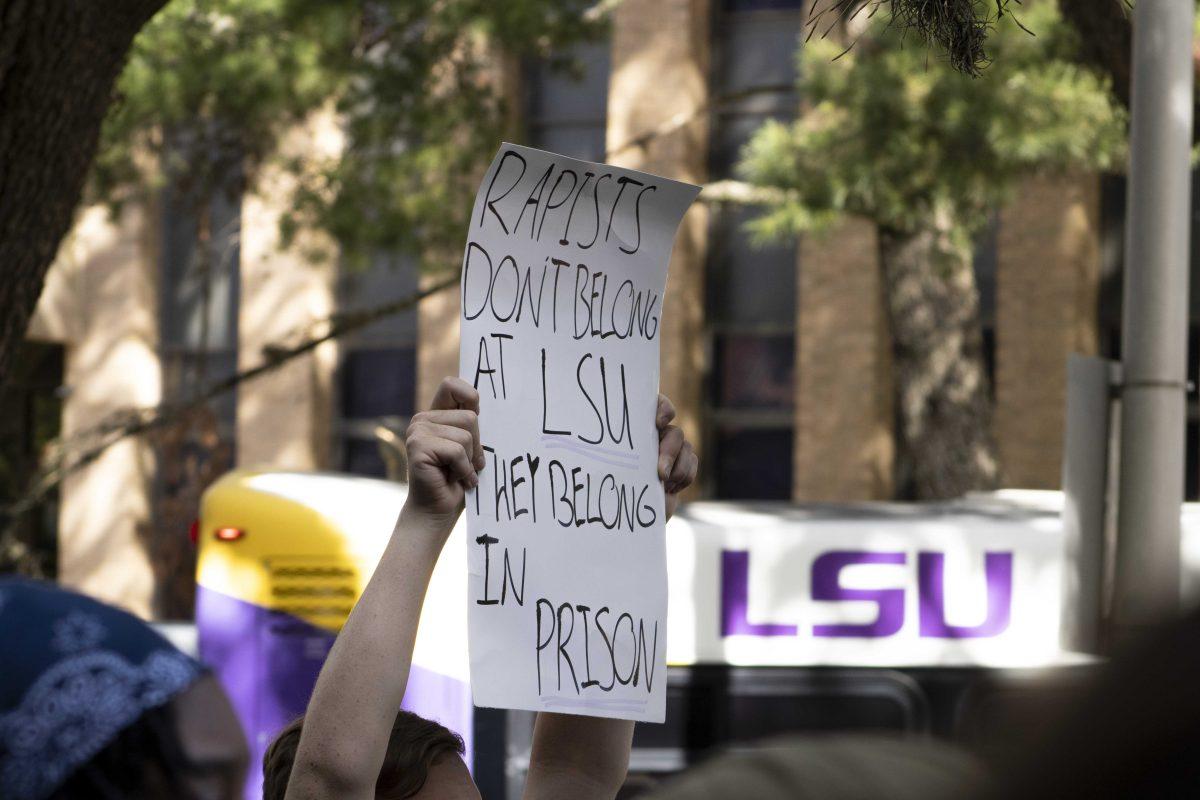According to a disturbing investigation by The Advocate, a Lafayette woman says 31-year-old LSU French graduate student Edouard d’Espalungue d’Arros raped her on a 2018 religious retreat in Rapides Parish.
The woman, who is referred to by her middle name “Anne” in the investigation, told The Advocate then-police Deputy Clayton Webb discouraged her from reporting the crime and even from receiving a forensic exam. Anne ignored Webb’s troubling dissuasion and pressed charges anyway.
The university removed d’Espalungue from his teaching duties following his rape charge, but he remained active on campus and continued to interact with students.
Soon after, d’Espalungue started the American Journal of French Studies, which allowed him access to local high school students. According to The Advocate, the university not only permitted d’Espalungue to run this journal but actively funded it.
The university recklessly endangered both LSU and high school students by allowing d’Espalungue to remain on campus. This series of deeply negligent, dangerous choices by university administrators enabled continued abuse.
During a ceremony for the journal led by d’Espalungue at the LSU French House, d’Espalungue “expressed to at least one witness his sexual and romantic interest in one of the high school essay contestants” and “within a few weeks d’Espalungue had seduced her into a sexual relationship,” reporter Andrea Gallo wrote in her investigation.
D’Espalungue was a man in his 30s preying on a high school student, enabled by this university to do so. Parents brought their children to an LSU-sanctioned activity and trusted the university would keep them safe.
Little did those parents know, they were putting their children under the supervision of a man charged with rape just a few parishes away.
That betrayal of trust extended to LSU students as well.
The Advocate’s investigation reveals faculty in the College of Humanities and Social Sciences failed on multiple occasions to report complaints against d’Espalungue.
The most aggressive enabler of d’Espalungue was French department chair Adelaide Russo, for whom d’Espalungue conducted research over his time at the university.
According to the investigation, Russo was frequently dismissive of claims against d’Espalungue. But she went far beyond passive dismissal in her defense of him.
Russo held a meeting with faculty and staff in 2018 to defend d’Espalungue’s innocence, despite months of complaints from multiple students.
Even worse, she sent an email in 2020 to faculty and graduate students saying that all Title IX concerns should be reported directly to her, and she would decide whether or not to bring them to the Title IX Office.
Russo’s absurd demand was in direct contradiction to university policy and a clear attempt to shield d’Espalungue from responsibility.
A similarly problematic set-up was revealed in athletics by Husch Blackwell, the law firm retained by the university after media coverage forced the university to investigate years of Title IX failures. Athletics administrator Miriam Segar often dealt with Title IX problems in-house instead of reporting them to the Title IX Office.
In the report, Husch Blackwell referenced other university departments that violated reporting policies. One of them was an unnamed academic department where the chair demanded all Title IX claims be brought only to the chair and discussed with no one else. The report said this department chair retaliated against those that defied this order.
It is possible, though yet uncertain, Russo is the department chair Husch Blackwell discussed. The media and students need to continue pressing the university for more details.
A recently filed lawsuit concerning mishandling of claims against d’Espalungue names Russo as a defendant. She has since been removed as the French department chair, but remains employed at the university as a professor on sabbatical.
The Advocate’s investigation also raises questions of what Humanities and Social Sciences Dean Troy Blanchard did to intervene in or report misconduct that was brought to his attention. Again, it is essential students pressure the university for transparency.
As Russo continued her shameless defense of d’Espalungue, a growing number of women brought serious claims against him.
An undergraduate student d’Espalungue had taught before being removed from teaching duties says he raped her in January 2019.
A few months later, another undergraduate student working at his journal says he groped and forcibly kissed her.
In September 2020, yet another undergraduate student said d’Espalungue took her to his apartment and raped her.
While university officials dragged their feet, actively defended him or passively enabled him, d’Espalungue committed horrible acts against women at this university.
The woman who says d’Espalungue raped her in September 2020 reported him to the Title IX Office. According to The Advocate, the university found him guilty of “sexual misconduct and endangerment” and penalized him with a one-year suspension.
This raises another issue entirely.
D’Espalungue’s punishment—the only formal punishment he would ever receive from the university, even after months of concerning complaints from multiple women—was a mere year-long suspension from campus.
If the university determines a student has committed such a terrible act, that student should never again step foot on this campus. A year’s suspension for rape is a shamefully weak punishment that degrades the seriousness of d’Espalungue’s actions.
It is incomprehensible why the university would want to give a diploma to a student its own institutional process found guilty of such a crime.
So much, both within and without the university, went wrong in handling claims against d’Espalungue. Incompetence in the judicial system allowed d’Espalungue to leave for his home country of France, and it seems he will never return to face consequences for his actions—if any even await him here at all.
The university must hold all those that enabled a serial rapist accountable, especially Russo, who offered d’Espalungue the vigorous defense his survivors deserved instead.
President William Tate IV must break from the apathy of past administrations and finally fight for students on this campus.
Claire Sullivan is a 19-year-old coastal environmental science sophomore from Southbury, CT.





